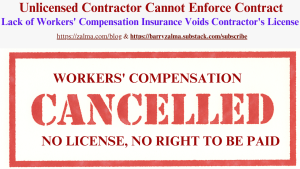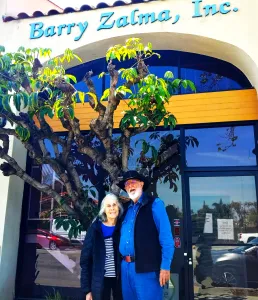Unlicensed Contractor Cannot Enforce Contract

Post 4892
See the full video at https://rumble.com/v5fa86i-unlicensed-contractor-cannot-enforce-contract.html and at https://youtu.be/-x4MigCCmJo
As a condition precedent to the issuance of a contractor’s license, continued maintenance, or reinstatement of a contractor’s license, California law requires applicants and licensees to have on file at all times a current and valid certificate of workers’ compensation insurance.
In American Building Innovation LP v. Balfour Beatty Construction, LLC, et al., G062471, G062965, California Court of Appeals (September 3, 2024) the contractor was unable to recover the contract payments because it did its work without a license.
NO WORKERS’ COMPENSATION, NO LICENSE, NO RIGHT TO BE PAID
Failure to obtain or maintain the required coverage results in the automatic and immediate suspension of the contractor’s license by operation of law. In California a party who was not duly licensed at all times during the performance of its contracting work generally cannot bring or maintain an action to collect compensation for that work.
As a result of the policy cancellation, ABI’s contractor’s license was suspended mid-project. Fully aware it was unlicensed and uninsured; ABI nevertheless continued its work.
ABI sued to recover amounts allegedly owed for its work on the project. The Board accepted ABI’s representation and retroactively reinstated its contractor’s license under section 7125.1.
The Court needed to determine if ABI was duly licensed at all times during the performance of its work; if not, section 7031 bars ABI from bringing or maintaining the present action. In this case, the lapse in coverage was not beyond ABI’s control. The record demonstrates the policy cancellation occurred because ABI chose not to pay billed insurance premiums. The insurer’s retroactive reinstatement of the policy following that settlement was essentially meaningless because it occurred long after the statute of limitations ran on any workers’ compensation claims, rendering the coverage illusory.
STATEMENT OF FACTS
ABI was on the project from August 2017 through May 2018. ABI concedes that its work on the project required it to be licensed and that it had to maintain workers’ compensation insurance throughout the project in order to maintain its license.
When ABI began its work on the project in August 2017, it had a workers’ compensation insurance policy issued. ABI did not pay approximately $33,000 in outstanding premiums, which State Fund asserted were owed for ABI’s 2015-2016 policy based on an audit State Fund had performed in 2017.
ABI received State Fund’s notice of cancellation; it nonetheless failed to make payment. Accordingly, State Fund canceled ABI’s 2017-2018 policy on January 25, 2018.
As a result of the policy cancellation, ABI’s contractor’s license was suspended by operation of law on January 25, 2018. The record establishes that Vo, ABI’s principal, knew that ABI’s policy had been canceled, that its license had been suspended, and that ABI was therefore not to engage in construction activities.
As for the construction project, Balfour Beatty, the general contractor, refused to pay ABI for its work. The Board apparently accepted ABI’s representations, as it reinstated ABI’s license retroactively; the Board also revised ABI’s license history to remove the January 2018 suspension under section 7125.2.
The trial court issued a statement of decision finding in favor of Defendants on the 31st affirmative defense, concluding ABI was “not ‘a duly licensed contractor at all times during the performance’ of the contract” and therefore “may not ‘bring or maintain’ this action ‘or recover’ compensation for its work.” The court then entered judgment in favor of Defendants and against ABI. ABI filed a notice of appeal from the judgment.
DISCUSSION
The trial court concluded that section 7031 bars ABI from maintaining this action because it was not ‘”a duly licensed contractor at all times during the performance”‘ of its contract from July 2017 through May 2018.
The Court of Appeal concluded that ABI was not entitled to retroactive reinstatement of its license under section 7125.2. Because ABI applied for retroactive reinstatement of its license more than 90 days (in this case, nearly three years) after the effective date of the certificate of insurance, the Board could only reinstate the suspended license if “the failure to have a certificate on file was due to circumstances beyond the control of [ABI].” Neither the policy cancellation nor the continued failure to have insurance on file were outside ABI’s control.
ABI’s representations were false. State Fund canceled the 2017-2018 policy effective January 25, 2018, because ABI made a considered decision not to pay the premiums due on the previous policy.
When ABI elected not to pay the premium due or procure workers’ compensation insurance elsewhere, ABI compromised the safety and security of its workers. It was not until over two years later, when faced with Defendants’ motion for summary judgment, that ABI agreed to pay the 2015-2016 policy premium so that its 2017-2018 policy would be retroactively reinstated.
The legitimacy of the public policies underlying California’s licensing laws and the validity of section 7031 are well established. Section 7031 applies despite injustice to the unlicensed contractor. Section 7031 represents a legislative determination that the importance of deterring unlicensed persons from engaging in the contracting business outweighs any harshness between the parties. The result is a stiff all-or-nothing penalty for unlicensed work.
The judgment and postjudgment order were affirmed.
The key to the public policy requiring contractors to be licensed is the protection of the public. The statute is Draconian but fair. If you do construction work without a license you cannot enforce the right to be paid for your work. ABI refused to pay the premium charged by the workers’ compensation insurer, who appropriately cancelled the policy, notified the licensing board who immediately suspended the license. ABI’s efforts to reinstate its license, by presenting false testimony, was ineffective because at the time ABI did the work it was unlicensed.
 (c) 2024 Barry Zalma & ClaimSchool, Inc.
(c) 2024 Barry Zalma & ClaimSchool, Inc.
Please tell your friends and colleagues about this blog and the videos and let them subscribe to the blog and the videos.
Subscribe to my substack at https://barryzalma.substack.com/subscribe
Go to X @bzalma; Go to Newsbreak.com https://www.newsbreak.com/@c/1653419?s=01; Go to Barry Zalma videos at Rumble.com at https://rumble.com/account/content?type=all; Go to Barry Zalma on YouTube- https://www.youtube.com/channel/UCysiZklEtxZsSF9DfC0Expg
Go to the Insurance Claims Library – https://lnkd.in/gwEYk
Like this:
Loading…







